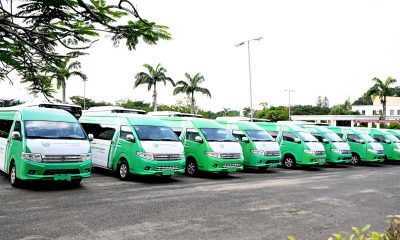News
Minister inspects Nigeria-assembled CNG buses, says transport costs to drop

Minister inspects Nigeria-assembled CNG buses, says transport costs to drop
Ahead of the roll-out of compressed natural gas (CNG)-powered mass transit buses meant for commuting nationwide, Finance Minister and Coordinating Minister of the Economy, Mr Olawale Edun, has inspected the assembly plant where the vehicles are being put together.
He expressed optimism that the buses when they hit the road would ease transportation and lead to a substantial slash in fares.
He expressed this view during his visit to the JET Motor Company Assembly Plant in Lagos.
The CNG buses are being mass produced under the Presidential CNG Initiative (PCNGi) as part of measures to reduce the high cost of living and curb inflation after the removal of fuel subsidy.
The Federal Government has promised to launch the first set of the CNG buses and tricycles by the end of this month (May).
Senior Special Assistant to the President on Media and Publicity, Temitope Ajayi, quoted the minister as saying, “I have come to see the CNG buses that Nigerians are asking about. I have seen them. “I have tested them and driven them. I have seen them being assembled. The benefits will soon be available to Nigerians.”
Edun highlighted the significant cost savings that CNG buses offer compared to their petrol-powered counterparts.
READ ALSO:
- Ex-Nigerian Ambassador to Canada dumps PDP for APC
- NSCDC arrests man for allegedly defiling 4-year-old girl in Ekiti
- Mbah places N10m bounty on killers of policemen in Enugu
“Two critical aims will be achieved. Whereas it costs about N55,000 to fill a 15-20 seater bus with petrol, it will cost between N12-15,000 to fill a CNG bus of the same capacity. This is three times, if not four times less.
“This is a huge savings that will help reduce transport costs and at the same time help reduce inflation,” he said.
According to him, the PCNGi is all about mass transit that is affordable, and praised JET’s employment of local talents in the assembly of the vehicles.
The Chairman and founder of JET, Chidi Ajaere, took the minister round the assembly plant during the visit.
Also on hand were the CEO of JET motor company, Engr Derek Ewelukwa, and other members of the JET team such as Sanjay Rupani of the Technical Development Department and Ebimo Ofongo, the plant manager.
Present also were Tosin Coker, Commercial Director at the PCNGi, and Joseph Osanipin, Director-General of the National Automotive Development and Design Council.
Ajaere commended President Bola Tinubu for his initiative in promoting local production of the CNG vehicles and the entire PCNGi team’s resolve to make the project a success.
JET was established in 2018 to build Electric Vehicles (EV) vans, pickups and CNG/Petrol buses tailored to meet Nigeria’s unique transportation needs.
Minister inspects Nigeria-assembled CNG buses, says transport costs to drop
News
Afenifere Calls for Immediate Take-Off of State Police as Terror Threats Rise in Yorubaland

Afenifere Calls for Immediate Take-Off of State Police as Terror Threats Rise in Yorubaland
The pan‑Yoruba socio-political group Afenifere has warned that escalating terrorist attacks in states bordering the South-West are heightening fears of a full-scale incursion into Yorubaland, calling on governors to urgently implement robust security measures and push for the take-off of state police.
In a statement by its National Publicity Secretary, Jare Ajayi, Afenifere expressed deep concern over repeated attacks in Kwara, Kogi, and Niger states, as well as kidnappings in Ondo, Ekiti, and Oyo states. The group cited the recent Woro and Nuku attacks in Kwara State, where nearly 200 people were reportedly killed and several others abducted, as a warning of the growing threat.
“This is a very disturbing development as cases of abduction seem to be on the increase in Yorubaland. Terror acts are no longer confined to rural areas; even cities like Ibadan have witnessed incidents,” the statement read. Afenifere highlighted the broad-daylight abduction of a schoolgirl in Ibadan’s Challenge area as a chilling example of the insecurity affecting urban centres.
Ajayi urged governors of the six South-West states — Oyo, Ogun, Osun, Ekiti, Ondo, and Lagos — as well as neighbouring states including Kwara, Kogi, Edo, and Delta, to implement practical security arrangements that will allow residents to “sleep with their two eyes closed.”
READ ALSO:
- CAF Confirms 2027 AFCON Dates, Reveals Host Cities, Stadiums Across East Africa
- Ronaldo Returns From Absence to Score in Al‑Nassr’s 2‑0 Win Over Al‑Fateh
- One Dead as Hausa, Benue Communities Clash at Port Harcourt Market
The group recalled that during a November 24, 2025, meeting in Ibadan, the South-West governors had agreed to strengthen regional security through measures such as the South-West Security Fund and the creation of monitoring centres to track potential terrorist activity. Afenifere noted that recent steps, such as Ogun State’s inauguration of CCTV monitoring centres, are commendable but insufficient.
Ajayi stressed that the persistence of banditry and terrorism is not due to a lack of intelligence, but rather the failure to effectively utilize available information. He insisted that state police should take off immediately, while communities must be empowered to develop local security arrangements, including support for the Amotekun Corps and other regional security initiatives.
“It is high time governors in Yorubaland went beyond sermonisation and swung into decisive actions that will make the region truly secure,” Ajayi said.
Afenifere’s warning comes amid growing concerns over security across southern Nigeria, where the spread of banditry, kidnappings, and terrorist attacks is increasingly threatening both rural and urban communities. The group’s call reinforces longstanding advocacy for state-level policing as a critical measure to combat rising insecurity.
Afenifere Calls for Immediate Take-Off of State Police as Terror Threats Rise in Yorubaland
News
UN Chief Calls Africa’s Security Council Exclusion Unfair, Outdated
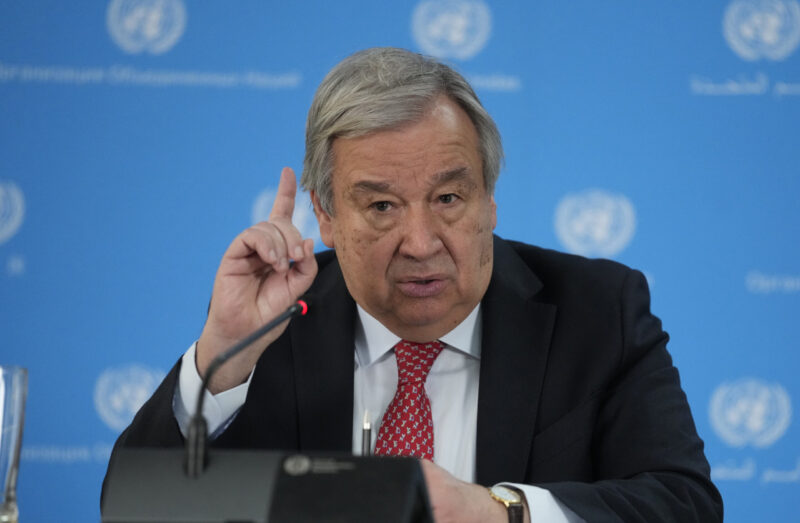
UN Chief Calls Africa’s Security Council Exclusion Unfair, Outdated
The Secretary-General of the United Nations, António Guterres, has described Africa’s continued exclusion from permanent membership of the UN Security Council as “indefensible”, calling for urgent reforms to reflect today’s global realities.
Guterres made the remarks while addressing world leaders, stressing that Africa—home to more than 1.4 billion people and a major focus of the Council’s peace and security agenda—remains without a single permanent seat in the UN’s most powerful decision-making body.
According to him, the current structure of the Security Council no longer reflects geopolitical realities of the 21st century and undermines the credibility and legitimacy of the United Nations.
“Africa is dramatically under-represented. This is not only unfair, it is indefensible,” Guterres said.
READ ALSO:
- Tragedy on Enugu–Port Harcourt Highway as 11 Die in Road Accident
- Kwara Govt, Security Agencies Analyse Terrorists’ Video to Identify Kidnap Victims
- 26 Killed as Bandits Attack Niger Communities, Burn Police Station, Homes
He noted that while Africa accounts for a significant proportion of issues discussed by the Council—including peacekeeping operations, sanctions, and conflict resolution—it remains excluded from permanent decision-making power, including the veto.
The UN chief reiterated his support for long-standing African demands for at least two permanent seats and additional non-permanent seats on the Council, in line with the African Union’s Common African Position on UN reform.
Guterres also warned that failure to reform the Security Council risks eroding trust in multilateral institutions at a time when global cooperation is most needed to address conflicts, climate change, terrorism, and humanitarian crises.
Calls for reform of the Security Council have intensified in recent years, with African leaders, alongside countries from Latin America and Asia, arguing that the current structure—largely unchanged since 1945—reflects post-World War II power dynamics rather than present-day global realities.
Despite widespread agreement on the need for reform, progress has been slow due to disagreements among UN member states, particularly the five permanent members who hold veto power.
UN Chief Calls Africa’s Security Council Exclusion Unfair, Outdated
News
INEC May Adjust 2027 Election Dates Over Ramadan Concerns
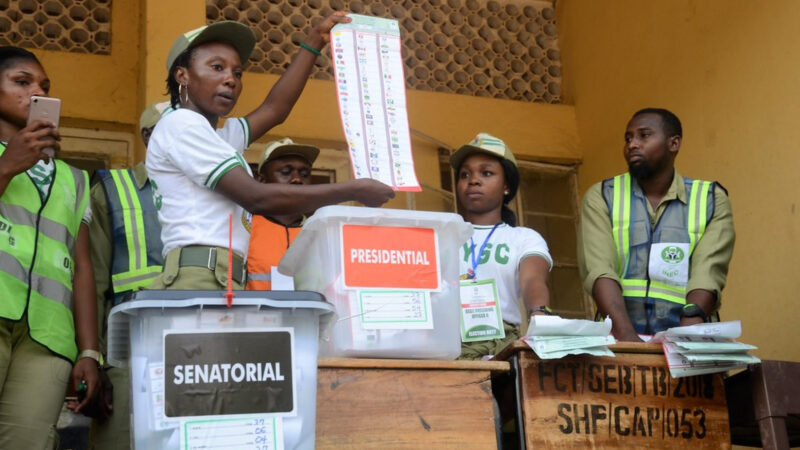
INEC May Adjust 2027 Election Dates Over Ramadan Concerns
The Independent National Electoral Commission (INEC) has acknowledged growing concerns over the timing of the 2027 general elections, which currently coincide with the holy month of Ramadan, and said it may seek legislative intervention if necessary to ensure full electoral participation.
In a statement released on Friday, INEC National Commissioner and Chairman of the Information and Voter Education Committee, Mohammed Kudu Haruna, said the commission is sensitive to public concerns and is consulting with stakeholders on possible adjustments to the election timetable.
The commission explained that the current schedule, developed in strict compliance with the Constitution of the Federal Republic of Nigeria, 1999 (as amended), the Electoral Act, 2022, and INEC’s own Guidelines and Regulations for the Conduct of Elections, 2022, sets Saturday, February 20, 2027, for the presidential and National Assembly elections, and Saturday, March 6, 2027, for the governorship and State Houses of Assembly elections. Party primaries are slated for May 22 to June 20, 2026.
READ ALSO:
- Man Allegedly Kills Brother in Rivers Over Witchcraft Accusation
- Regina Daniels Gifts Mother Two Luxury SUVs in Emotional Surprise
- El-Rufai Alleges Ribadu Ordered Arrest, Says Intercepted Calls Exposed Plot
However, INEC noted that these dates overlap with Ramadan, a period of fasting, prayer, and religious observances for Muslims, which could affect voter turnout and participation, particularly in predominantly Muslim areas. The commission emphasized that any adjustment to the timetable will remain consistent with constitutional and statutory requirements.
“The commission wishes to assure the public that it remains sensitive to all legitimate concerns that may impact electoral participation and the overall conduct of elections. In view of these representations, INEC is currently undertaking consultations and may, where necessary, seek appropriate legislative intervention,” the statement read.
Several political figures have already expressed concerns. Former Vice President Atiku Abubakar called on INEC to reconsider the February 20 date, citing potential disruption of voting during Ramadan. Former presidential aide Bashir Ahmad also urged the commission to review the schedule to avoid disenfranchisement of Muslim voters.
The commission reaffirmed its commitment to conducting transparent, credible, and inclusive elections. It promised to keep the public informed of any adjustments to the election timetable arising from consultations with political parties, civil society, and religious stakeholders.
The debate over the 2027 election schedule highlights the challenges of balancing constitutional timelines with religious and cultural sensitivities, underscoring the importance of ensuring accessible and fair elections for all Nigerians.
INEC May Adjust 2027 Election Dates Over Ramadan Concerns
-

 Education7 hours ago
Education7 hours agoCheck Your Name: UNILORIN Releases Updated NELFUND Refund List for 2024/2025 Students
-

 News2 days ago
News2 days agoAso Rock Goes Solar as Tinubu Orders National Grid Disconnection
-

 metro2 days ago
metro2 days agoLagos Police Launch Manhunt for Suspect in Brutal Ajah Murder
-

 Sports2 days ago
Sports2 days agoLookman Shines as Atlético Madrid Hammer Barcelona 4-0
-

 metro1 day ago
metro1 day agoBoko Haram Terrorists Release Video of 176 Abducted Kwara Residents
-
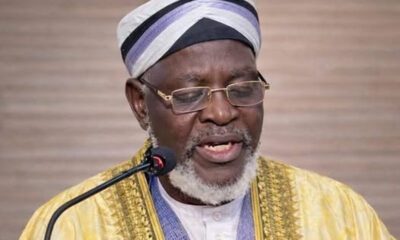
 metro2 days ago
metro2 days agoCourt Orders DIA to Produce Cleric Accused of Coup Plot by February 18
-
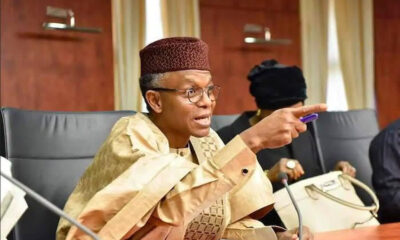
 metro3 days ago
metro3 days agoEl-Rufai to Appear Before EFCC After Alleged Airport Arrest Attempt
-

 News3 days ago
News3 days agoMPAC Hails Supreme Court Verdict Affirming Muslim Students’ Right to Worship at RSU







